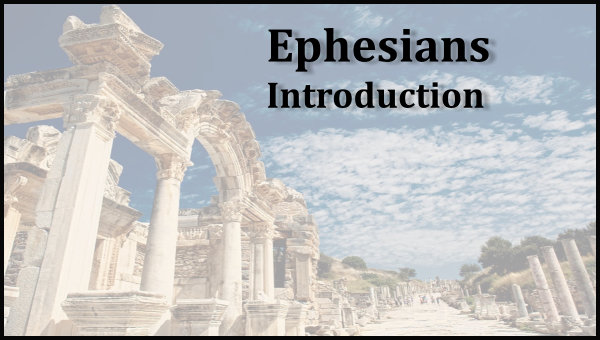By Tyson Thorne

This week we start a new series on the book of Ephesians. One of Paul’s “prison epistles,” Ephesians was written alongside the letters Philippians, Colossians and Philemon about ad 60-62. The Ephesian church was built five years previous to this letter, and became the central hub of Christian missions. Ephesus was a costal metropolis which thrived under Roman rule. At it’s sea ports stood the temple of Diana, 425 feet long, 220 feet wide, to greet all travelers arriving by ship. Because it held one of the Seven Wonders of the World it was also an area heavily populated with metal workers who would form Diana replicas, charms and amulets of all kinds. Although accessible from the coast, the city spread across the plains and up into the hillside, where one would find the theater of Diana among a plethora of housing facilities for both Greeks and Jews. It is said the disciples of John the Baptist resided there after the ascension of Christ. Although the Jews and Greeks were the predominant cultures, there were always travelers, adventurers and traders flowing through the city. It was the hot spot of Diana worship and very few religions were able to survive. This is evident also from the book of Acts where we are told Paul’s preaching caused a two hour riot throughout the city.
Paul’s words contain what he thought important for mature, evangelical Christians. He desired the Ephesian’s to understand God’s plan for the future and His will for their lives. This is the central purpose for the book, which divides neatly into two sections: chapters one through three explaining God’s plan for the universe (“all things in heaven and earth together under one head, even Christ”), and chapters four through six, the explanation as to how these truths are to affect the way they live (“As a prisoner for the Lord, then, I urge you to live a life worthy of the calling you have received…” – 4.1). The book demonstrates how unity in the body of Christ is maintained in order that Christians may show worthiness and obedience to their high calling. In short: “Unity in the body results from understanding our place in God’s plan and victory in spiritual battle.”
Despite this being a prison epistle, it is one of Paul’s most joyous; it discusses the advantages of living in Christ. Because of the love of the Father we were chosen by grace to preach the gospel and to stand firm against the devil and his emissaries. We stand only because the Father has exalted Christ as Head over all the authorities and rulers of the heavenly realms. With Christ we find unity in the church and experience His power in our lives. We are taught that as we submit to Christ and others we perform the will of God; and God gives us power and a powerful armor with which we can stand fearlessly. Through all this we are to always remember prayer, our way of keeping in line with and experiencing the will of the Father.
Outline of the Book:
I. The Will of God, 1
A. God chooses us to be holy and blameless
B. Paul prays for God’s will to be accomplished
C. Paul explains how to carry out God’s will
II. The Transformation of Believers, 2
A. The way we were
B. The way we are
C. The way we will be
III. The Plan of God, 3.1-5.21
A. An elaboration of the will of God
B. Paul again prays for God’s will to be accomplished
C. The results of the plans fulfillment
D. Results fulfilled by the transformation of believers
IV. The Relationships of Believers, 5-6.20
A. In marriage
B. At home
C. At work
D. Toward our opponent
Closing: Prayer requests and the benediction.
|
|
